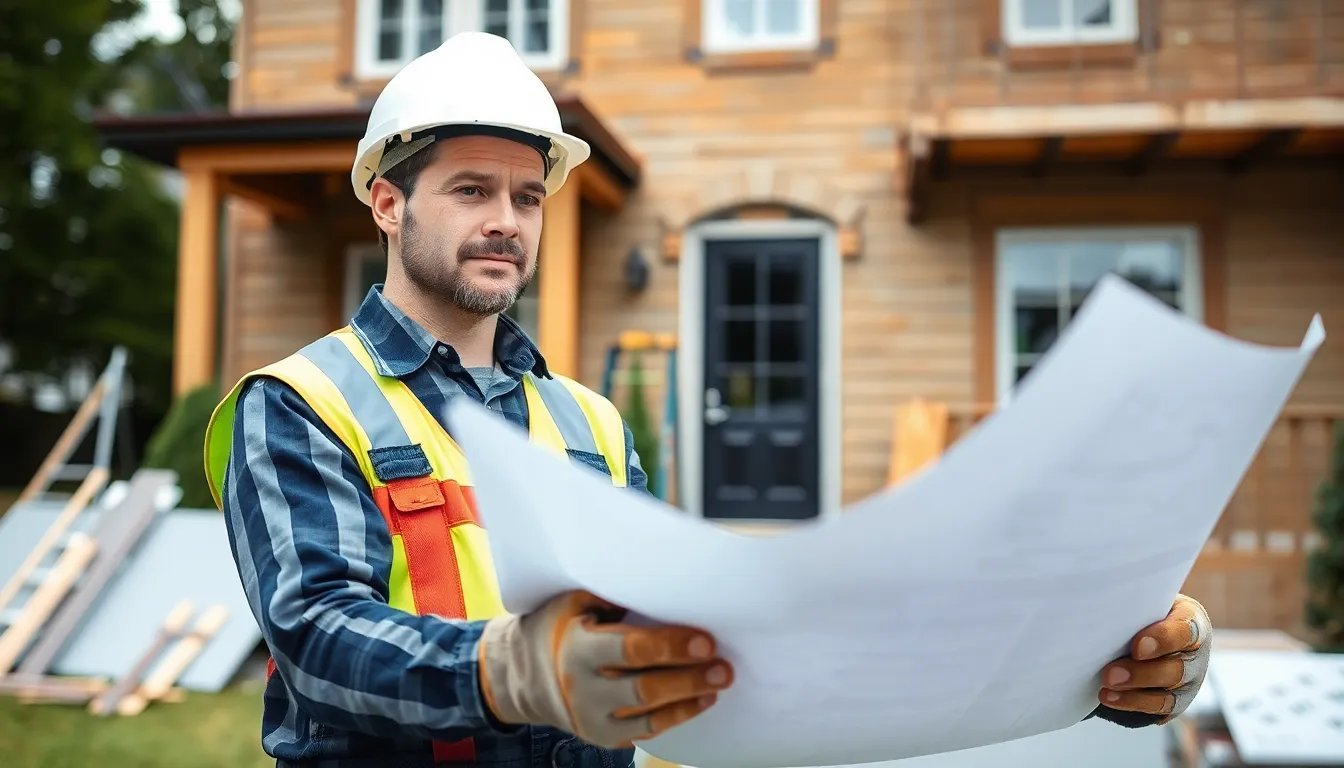In the world of home improvement, having the right contractor can make or break a project. Imagine hiring someone who claims to know the difference between a hammer and a screwdriver but can’t tell a stud from a hole in the wall. That’s where the home improvement contractor license in New Jersey comes into play. It’s like a badge of honor for professionals who’ve jumped through the right hoops to prove they know their stuff.
Table of Contents
ToggleOverview of Home Improvement Contractor License NJ
A home improvement contractor license in New Jersey ensures that contractors meet specific requirements. This license verifies that professionals have the knowledge and skills necessary to perform home improvement tasks effectively. Qualifying for this license requires contractors to complete an application, provide necessary documentation, and pass exams that assess their expertise.
New Jersey defines home improvement activities broadly, covering renovations, repairs, and additions. Contractors engage in activities that enhance the functionality or appearance of residential properties. Without this license, contractors cannot legally perform home improvement work in the state.
The New Jersey Division of Consumer Affairs administers the licensing process. This division establishes regulations, including consumer protections for homeowners hiring contractors. Homeowners benefit from knowing their contractor has adequate training and experience.
Contractors must adhere to state regulations regarding insurance and bonding. Having liability insurance protects both the contractor and the homeowner in case of accidents or damages. Additionally, bonding serves as a financial guarantee that contractors will fulfill their contractual obligations.
The licensing process also includes a continuing education requirement. Contractors must stay updated on building codes and industry standards to maintain their licenses. This ongoing education ensures that licensed contractors provide high-quality services and comply with best practices.
Understanding the home improvement contractor license in New Jersey aids homeowners in making informed decisions. A properly licensed contractor can enhance project outcomes and provide peace of mind. Verification of a contractor’s license can often be completed online, ensuring transparency and accountability within the industry.
Requirements for Obtaining a License

Home improvement contractors in New Jersey must meet specific criteria to obtain their license. These requirements ensure contractors have the necessary qualifications and expertise for home improvement work.
Age and Experience Requirements
Contractors must be at least 18 years old to apply for a license. Significant experience in the field is also essential. Candidates typically require a minimum of three years of practical experience in home improvement projects. This experience can involve a variety of tasks, including renovations, repairs, and installations. Documented proof of work history may be necessary for applicants to demonstrate their competency.
Education and Training
Educational requirements play a critical role in the licensing process. Contractors must complete approved education programs that cover essential topics such as building codes and safety regulations. Training can involve various options, including vocational schools and community college courses. These programs aim to equip applicants with the knowledge needed to navigate state laws and industry standards effectively. Continuous education credits are also necessary to maintain and renew the license.
Application Process
The application process for a home improvement contractor license in New Jersey involves several key steps and necessary documentation.
Steps to Apply for a License
First, applicants must complete an application form provided by the New Jersey Division of Consumer Affairs. Next, it’s crucial to pay the associated application fee. Completing a criminal background check is also a requirement, as it aligns with state regulations. Once these steps are completed, applicants submit proof of their work experience along with the application. After thorough review, the Division issues the license if all conditions are met.
Necessary Documentation
Documentation includes proof of identity, such as a government-issued ID. Applicants must also present verified work history, demonstrating a minimum of three years of relevant experience in home improvement. Furthermore, educational credentials are essential; transcripts from approved programs covering building codes and safety regulations must be included. Maintaining copies of liability insurance and surety bonds is mandatory, ensuring protection for both contractors and homeowners during project execution.
Benefits of Having a Home Improvement Contractor License
A home improvement contractor license in New Jersey brings numerous advantages for both contractors and homeowners. First, licensing ensures that contractors possess the required skills and knowledge to complete projects effectively. Proper training results in higher-quality work, which directly benefits homeowners.
In addition, licensed contractors must follow state regulations regarding insurance and bonding. Such protections offer peace of mind for homeowners, knowing they are covered in case of accidents or damages during a project. This accountability fosters trust between contractors and clients.
Transparency is another key benefit. Homeowners can easily verify a contractor’s licensing status online, allowing for informed decisions when choosing a professional. This verification process enhances accountability within the industry.
Continuing education is mandated for licensed contractors, ensuring they stay updated on building codes and industry standards. Such ongoing learning leads to better project outcomes, as contractors incorporate the latest best practices and safety regulations.
Moreover, having a home improvement contractor license can differentiate professionals in a competitive market. A license demonstrates credibility to potential clients, increasing the chances of winning contracts. Homeowners often prioritize licensed contractors over unlicensed individuals due to the assurance of quality and compliance.
Finally, licensed contractors may access specific resources and networks that unlicensed professionals do not. These networks can provide valuable support and information, further enhancing project quality and efficiency. Overall, obtaining a home improvement contractor license proves beneficial for both contractors and homeowners in New Jersey.
Common Challenges in the Licensing Process
Navigating the licensing process for a home improvement contractor in New Jersey presents various challenges. Applicants often face confusion regarding specific requirements. Inconsistent documentation can lead to delays or rejections. Ensuring accurate proof of work history remains a common hurdle. Contractors frequently underestimate the importance of completing approved educational programs.
Additional complexity comes from the mandatory criminal background check. Any previous offenses can complicate the approval process. It’s crucial for applicants to prepare their documentation thoroughly. Lack of clarity about insurance and bonding requirements often leads to missteps. Without proper coverage, contractors risk losing their application approval.
Time constraints also create issues. Applicants must meet deadlines for submitting forms and documentation. Procrastination might result in missed opportunities for licensure. Contractors need to stay informed on any changes in regulations. Regulations can evolve, affecting the requirements for obtaining a license.
Financial aspects play a significant role in this process. Application fees and costs for required educational programs can add up quickly. Contractors must budget accordingly to avoid financial strain. Another major challenge is maintaining compliance with ongoing continuing education requirements. Keeping up with training ensures they remain knowledgeable about industry standards.
Verification of licensing status presents additional difficulties. Homeowners or agencies might find the online resources cumbersome or unclear. Uncertainty can lead to hiring unlicensed individuals inadvertently. Building strong comprehension of the licensing landscape is vital for both contractors and homeowners. Effective communication about these challenges enhances overall understanding and navigational success.
Navigating the home improvement contractor licensing process in New Jersey is essential for both contractors and homeowners. A licensed contractor not only ensures compliance with state regulations but also guarantees a higher standard of work. By understanding the requirements and benefits of the licensing system, homeowners can confidently select qualified professionals for their projects.
The emphasis on continuing education and adherence to safety regulations fosters a trustworthy environment within the industry. For contractors, obtaining and maintaining a license enhances credibility and opens doors to valuable resources. Ultimately, awareness of the licensing process leads to better project outcomes and satisfaction for everyone involved.







